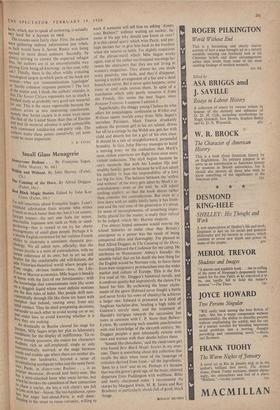Small Glass Menagerie
Aimee-vous Brahms . . . By Francoise Sagan. (John M urray, 9s. 6d.)
Rim* Magic Stories. Edited by John Keir Cross. (Faber, 16s.) „.14. still 'uncertain about Frangoise Sagan. I can't 7lthhold admiration from anyone who writes French so much better than me; but it's an uneasy, foreign respect—the sort one feels for minor, Inscrutable Japanese arts such as Nob or sand- gardening—that is roused in me by her chaste arrangements of small glass people. Perhaps it is a hostile English reverence for her ruthless French choto incarnate a consistent theoretic psy- human We all admit now, officially, that the Psyche is a mess of contradiction, with no Intlate coherence of its own; but in art we still flanker for the comfortable old will-fictions, the r°e Victorian-theatrical world where people act ;n1 single, obvious motives—love, the Life- orce or Marxist economics. Mlle Sagan is bleakly at h°me with the fact of our formlessness : with the knowledge that consciousness rests like scum " a sluggish liquid whose most definite motions are the dim tides of habit. Her pe6ple drift non- eftmittally through life like those toy boats with csaMphor tied behind, veering away from any ..°1(1 contact. They lie abed postponing decisions, surrender to each other to avoid saying yes or no, and make love to avoid knowing o whether it is -ve they are making. As drastically as Racine cleared his stage for Passion, Mlle Sagan strips her plot to laboratory eon) nditions for the-display of indifference. To re- move outside pressures, she makes her characters nntidents, rich or self-employed; single or only ,.-ne°Mmittally married; at the stage between ,ectopuefirii:snd middle age where there are neither dis- nor landmarks, beyond a sense of tueomulating toothpaste tubes and the same furni- i„,re. Paule, in Aintez-vous Brahms . . ., is an interior decorator, divorced and thirty-nine. She loss a semi-attached lover who owns lorries, but ,21en he invokes the casualness of their connection flu,eliase a starlet, she lets a rich client's son fall leVe with her—Simon, the too-handsome, spine- irs but eager heir-about-Paris, is well done : illPing in the street to rouse curiosity, willing to work if someone will tell him to, asking 'Aimez- your Brahms?' without waiting an answer, be-
cause at his age why should one know or care? It is this casual query which wins Paule, and per- haps decides her to give him back to his freedom when she returns to habit. I'm slightly suspicious of the phrase-motif which Mlle Sagan works again, and of the rather too frequent warnings be- tween the characters that they are not living in women's magazines. They almost do; one shade more passivity, one feels, and they'd disappear, leaving a stylish arrangement of a hat and a dead
branch on velvet. But it never quite happens; some irony or cool aside revives them. In spite of a translation which only partly removes it from the French, this seems the best Sagan since Bonjour Tristesse. I suppose I admire it. Superficially, the shaggy young Chelsea-ite who offers his unapologetic confession in Within and Without seems worlds away from Mlle Sagan's nerveless Parisians. Mark Fearon drunkenly seduces the prettiest girl at his art school, drives her off to a cottage by the Welsh sea, gets her with child and deserts her for a girl of his own class. It should be a tale of straightforward, purposeful brutality. In fact, John Harvey manages to build a moving irony on the realisation that Mark's most violent assertions are flight from even more violent indecision. The idyll begins because he can't reconcile Sue with his London' life and wealthy family; goes on because he will not admit his inability to face the responsibility of a love too big for him. The balance between the 'within and without' of the story gets upset by Mark's in- articulateness—even at the end, he will admit nothing explicit, so that the book shares rather than contains his contradictions. But even as a love story with an oddly hastly hero, it has fresh- ness and the real tone of the generation it's about. Its sense of incompleteness, of something imper- fectly placed'for the reader, is really their refusal to be judged, which Mr. Harvey respects.
I've always hoped someone would rewrite the school histories to make clear that Britain's emergence as a power was the result of being conquered often and thoroughly. I'm pleased to find Alfred Duggan, in The Cunning of the Dove, recruiting Edward the Confessor for my camp. He attributes to Westminster Abbey's founder the sensible belief that on his death the best thing for the English would be Norman rule, to force them from their sanguinary provincialisminto the wider market and culture of Europe. This is the first I've read of Mr. Duggan's historical novel's, and it confirms quietly but impressively the claims I've heard for him. By eschewing the lesser excite- ments of the genre (Edward never fought a battle and never broke his vows of chastity) he achieves a larger one. Edward is presented as a kind of Anglican bachelor-don, heading a high table of Godwin's unruly sons, and the treatment of Harold's intrigues towards the succession has more in common with C. P. Snow than Bulwer- Lytton. By combining such sensible anachronism with real knowledge of the eleventh century, Mr. Duggan peoples a past inhumanly remote with /men and women with their deaths before them.
'Sounds like chocolates,' said the cloakroom girl who found Best Black Magic Stories in my over- coat. There is something about this collection that recalls the days when most of the language of criticism-derived from food—'all the ingredients,' 'done to a turn' and so on. Perhaps it's because that was the genre's great age, of the hasty, ulstered departure from Paddington with wolfbane, Bible and newly sharpened stake. I recommend the stories by Margaret Irwin, M. R. James and Ray Bradbury as particularly chock-full of good, black things.
RONALD BRYDEN






































 Previous page
Previous page